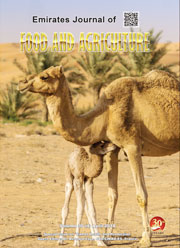EFFECTS OF FISH OIL ON THE PRODUCTION PERFORMANCES, POLYUNSATURATED FATTYACIDS AND CHOLESTEROL LEVELS OF YOLK IN HENS
DOI:
https://doi.org/10.9755/ejfa.v25i8.14005Keywords:
Omega-3 fatty acids, Hens, Egg quality, Cholesterol, PerformanceAbstract
This study was conducted to show that dietary supplementation of fish oil, effects growth performance, egg quality and decreases yolk cholesterol in laying hens. One hundred twenty Bovans white hens at their 23rd week of age were housed individually in cages in an open sided house. The birds were kept under a 16 hr light: 8 hr dark lighting schedule (lights on between 06:00 and 22:00 hr). Birds were randomly divided into five dietary treatments and 3 replicates in each (8 birds per replicate); the first treatment group was control and given 0% fish oil + 5% vegetable oil, the second treatment given 1.25% fish oil +3.75 % vegetable oil, the third treatment given 2.5% fish oil + 2.5% vegetable oil, the fourth treatment given 3.75% fish oil + 1.25% vegetable oil and the fifth treatment given 5% fish oil + 0% vegetable oil. The birds were raised for 12 weeks from 23 weeks of age to evaluate the effect on growth, egg quality, yolk cholesterol and linoleic and linolenic fatty acids content in yolk. Body weight gain was increased significantly (P ? 0.05) by 9.2% in birds fed diets content 3.5% fish oil, as compared with those fed on control diet and feed intake was decreased significantly (P ? 0.05) by 26.4% in birds fed diets content 5% fish oil, as compared with those fed on control diet. Also, egg weight was decreased significantly. Due to fish oil egg quality were improved. Interestingly, yolk cholesterol was decreased significantly (P ? 0.05) by 14.5% in birds fed diets content 3.5% fish oil, as compared with those fed on control diet. Furthermore, it was observed significantly increase (P ? 0.05) in linolenic fatty acid content in yolk by 30.5% in birds fed diets content 3.5% fish oil, as compared with those fed on control diet. In conclusion, feeding fish oil deceased feed intake, egg weight and egg production on the other hand, increased unsaturated fatty acids and cholesterol content in yolk in laying hens.










 .
. 